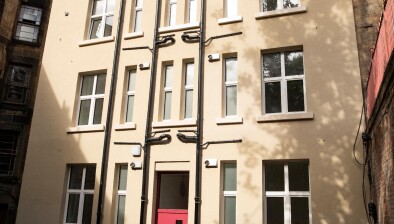Upper Tribunal awards extra £330 to tenant who moved out of property due to mould spores

The appeal was heard by Sheriff George Jamieson of the Upper Tribunal for Scotland
A tenant who was awarded £770 by the First-tier Tribunal as compensation after being unable to use parts of her rented property due to dry rot has been awarded an additional £330 after making an appeal to the Upper Tribunal.
Appellant Katherine Zhao originally sought £4,000 from her former landlord Edward Dunbar for various breaches of the habitability clauses of their tenancy agreement. She argued that the First-tier Tribunal had disapproved compensation on parts of her claim based on her lack of medical evidence.
The appeal was heard by Sheriff George Jamieson of the Upper Tribunal for Scotland. The appeal was not opposed by the respondent, although he made some submissions in relation to the claim.
Fungal spores
On 14 July 2020 the appellant reported to the respondent that there was fungal mould within the property in Duffus, Elgin, which she had been renting since January 2019. After an inspection on 28 July established that the issue was dry rot, the respondent arranged for works to be carried out on the tenanted property and the larger property of which it formed part. As a consequence of the work the appellant and her daughter were unable to use a large bedroom and staircase within the property between August and October 2020.
The tenancy came to an end on 30 October 2020 after the appellant left the property. Before securing alternative accommodation, she had to pay £300 for emergency property and taxi costs of £95. After making an application to the First-tier Tribunal it was found that she had been unable to enjoy full use of the property, with losses assessed at £770. An appeal was allowed solely on the question of whether the FtT had adequately considered the appellant’s head of claim 4, relating to the impact to her health, safety and security, and the time she had to spend to deal with her claim.
In relation to head of claim 4(a) the FtT noted that the appellant had not provided evidence to support her claims for mental or physical injury arising from stress or mould. However, in relation to the impact on the Appellant’s safety and security, head 4(b), which included such factors as construction dust, fungi spores, dead flies, and a roof leak, there was no indication of the level of consideration given by the Tribunal.
It was the appellant’s position that, as non-Covid related physical health checks were not normally granted during lockdown, she was unable to obtain a GP appointment and thus could not comply with the Tribunal’s request. The respondent submitted that he had been advised that the dry rot fungal spores were not a health risk and he had relayed this information to the appellant. The onus was on her to prove injury caused by any aspect of the dry rot or works associated therewith.
Not an exact science
In his decision, Sheriff Jamieson noted: “The Upper Tribunal is not satisfied that, even during Covid lockdown, the appellant would have been unable to instruct an expert medical report to support this head of claim. A GP report might have confirmed injury but is unlikely to have sufficed for the purposes of proving causation.”
However, addressing whether the FtT had erred in law in respect of head of claim 4(b), he continued: “The First-tier Tribunal made no reference to this separate head of claim either in their Decision dated 6 September 2021 or their separate Decision dated 15 November 2021 refusing the Appellant permission to appeal. The Appellant was entitled to claim additionally for inconvenience arising from the issues she reported under this head of claim.”
Assessing a figure for compensation in relation to this, the sheriff said: “The Upper Tribunal does not think the description so severe that the subjects were rendered completely uninhabitable by the Appellant, but this breach of contract does entitle the Appellant to an award of compensation for inconvenience. A comparator case which may assist in assessing such an award of compensation is McArdle v Glasgow District Council (1989), in which the tenant suffered inconvenience for living in damp conditions for a period of approximately five years. She was awarded compensation for inconvenience in the sum of £750 by the sheriff in her action for damages in Glasgow Sheriff Court.”
He went on to say: “Awards of compensation for inconvenience in housing cases have tended historically to be quite low. Amongst the most generous awards noted in Robson and Combe’s Residential Tenancies (4th edition, 2019) is that in the case of Christian v Aberdeen City Council (2005), another dampness case, in which the pursuer was awarded £2,750 on 12 August 2005 for inconvenience lasting for nearly four years. That represents no more than £60 a month, or approximately £100 a month adjusted for inflation at a multiplier of 1.68.”
Sheriff Jamieson concluded: “Awarding compensation for inconvenience in housing cases is not an exact science and each case must turn on its own facts and circumstances. In the present case, taking a broad and generous approach, a sum of £330, roughly £100 a month, appears to the Upper Tribunal to be the appropriate sum for compensation.”
The decision of the First-tier Tribunal was therefore remade only to the extent of awarding the appellant an additional £330 in respect of her head of claim 4(b).







